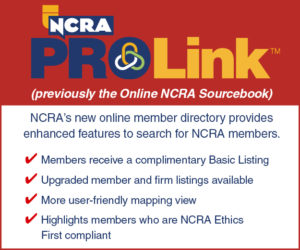As a realtime writer, how important is preparing for a job to your routine. The JCR asked several reporters.
Reporting a deposition or other event in realtime doesn’t need to add stress to your day. Knowing your software and its shortcuts, having a plan, and being prepared for the topics you hear will go a long way to helping you provide flawless realtime on the job.
Know your software
Several reporters interviewed by the JCR said the first step to being prepared is to know your software.
“Our CAT vendors have provided us with a large number of tools to not only prepare for realtime jobs but, more importantly, on-the-fly correct your realtime feed from your writer using macros, realtime commands, speaker fields, etc.,” said Sandy VanderPol, RMR, CRR, a freelancer from Lotus, Calif. VanderPol, who also holds NCRA’s Realtime Systems Administrator credential, noted that this is the single most important piece of advice she could share.
“Be familiar with your CAT software capabilities and let your software work for you. My software has options to power define entries from the writer. Whenever you can keep your hands on the writer and add entries, it gives you just that extra bit of time to do things quickly and make your feed even more clean on the fly,” said Lynette L. Mueller, RDR, CRR, a court reporter in Johns Creek, Ga. “My software also has AccelerWriters dictionary entries to J-define words, delete last untranslate, define the last untranslate, delete an extra Q and A, fix a translated word, and much more!”
Many of the software companies offer specific training on these features. They also work through various associations to help court reporters better use their products. And it pays off for reporters. Many of the CAT products can now offer users the ability to define a stroke after the fact, suggest strokes, or fix or delete untranslates – all of which create a smoother product for your clients.
“I always learn as much about my software as I can,” said Marjorie Peters, RMR, CRR, also credentialed as a Realtime Systems Administrator, a reporter from Pittsburgh, Pa. She noted that the CAT software features are like “very powerful tools that can ease my work (and mind) as I write to help me provide the cleanest translation. Even if I do receive a Complaint or find information about the witness, unanticipated phrases, terms, and number sequences will crop up in a deposition, only to be repeated multiple times. [Case CATalyst’s] Brief It and Live Suggestion come to my aid every single time.”
Know your system
The reporters also said that knowing your system inside and out will save you valuable time if you do encounter problems. For Peters, prepping for a realtime job “involves two distinct elements: the tools and the writing. When I know the realtime equipment setup that I will be using inside and out, I can walk into a deposition suite calmly and confidently. That removes stress. If there is any troubleshooting that has to be done, I can be more focused on finding the resolution and will do so quickly because I am already confident that my realtime equipment is set up properly.”
Peters explained that her need to get problems fixed quickly comes from her days working as a broadcast and CART captioner. “In broadcast captioning, we have to record the actual time spent resolving a technical issue and then file a written report,” said Peters. But, she noted, the same kind of knowledge can help in court, depositions, or any other situation you find yourself in.
“I practice setting up using different schemes: Internet-delivered realtime streaming or local wireless stream; netbooks vs. iPads, or both; and then all of the above, wirelessly streaming locally and over the Internet at the same time,” said Peters. “I want to always be ready to send a stream to someone who is not in the room. Many times an attorney taking a deposition will ask whether realtime can be sent to his colleague back at the law firm. It’s an excellent tool in that scenario as well as for someone participating by conference call to view the realtime stream. It reinforces the value that I can bring to the client as a proficient realtime writer.
“When I practice and prepare both my hardware/software and writing, I am more relaxed and write at peak performance,” said Peters.
VanderPol feels that preparation is constant, referring to a job she took recently: “Just today, I spent about two hours preparing for a LiveDeposition realtime, audio, and video feed. I have a new computer and haven’t worked with LiveDeposition streaming for several months, so testing the technology on my end and with the client was a necessity to ensure client satisfaction and for my peace of mind.”
Update your dictionary
Reporters still rely on word lists and the notice or prior transcript to get a sense of the vocabulary, although many of them also said they would go a search for the deponent on Google.
“I am always adding in dictionary entries,” said Lesia Mervin, RMR, CRR, of Visalia, Calif. “Recently, I had a realtime criminal proceeding with 30 defendants and 30 attorneys and their Hmong and Laotian interpreters. I got the docket ahead of time and then I made briefs for every defendant using the first syllable of their names written twice and each attorney with the first syllable of their first or last name.
“I also do a lot of international conference captioning that requires speaker ID for 125 countries in case they speak,” Mervin continued. “I spend a great deal of time perusing the conference website, looking for documents and prior sessions, inputting names and possible terms, making sure I have all the country names with brief forms and also written out.”
Most of the reporters said that dictionary building is a continuous process. “It’s not just the individual job you’re prepping for, but general knowledge and dictionary entries of words in case they come up,” said Mervin.
As a federal official reporter, Cathy Pepper, RMR, CRR, of New Orleans, La., looks at whatever information is available. “If it is criminal matters and I am just handed a cover sheet with names and numbers of cases, I hurriedly make briefs for the defendants’ names and their attorney’s names,” she said. “If it is a civil oral argument, I look at the relevant briefs and skim through them looking for words or phrases of what they will be discussing and make briefs for that, along with making briefs for the plaintiff’s and defendant’s name as well as the attorneys’ names. If it is a civil trial, I will get a copy of the Pretrial Memorandum and make briefs for commonly occurring words and phrases concerning the case, the parties’ and witnesses’ names, and the attorneys’ names.
“I skim through documents in the case and pick out what I think they will be discussing and make briefs ahead of time so that I can write shorter and faster,” Pepper explained.
“Realtime has become such a constant for me personally in that I connect to my iPad with every job,” said Debra A. Levinson, RMR, CRR, CMRS, CRI, CEO of DALCO Reporting, Inc., based in New York and White Plains, N.Y. “The day-before prep has really become nonexistent for me. Others on our staff who do not follow this routine will run through a set-up the day before: I always Google search a deponent for a realtime deposition regardless of being provided with a word list or notice or prior transcript. I read a few URLs and jot down some words on a Microsoft Sticky Note the night before. At the job, I stroke out any case specific names or words available. Invariably, the parties will talk about topics other than what I’ve prepared for, so I’m ready to make appropriate briefs for words or phrases that are used repetitively.”
Even so, Levinson doesn’t skimp on the basics: She said she makes sure to arrive early, properly fed, and with a positive mindset. “And a supply of snacks!” she said. “I never lunch out and am prepared to work through every single recess short of comfort breaks.”
Final words of advice
“My realtime goal is to always strive for 99.8 percent translation rate on every job,” said Mueller. “The prep work is essential to maintain or exceed that goal. My writing is constantly evolving. Writing short is paramount to the success of my translation rate, for keeping up with the fast talkers and, also, being kind to my body — specifically my back and hands.”
“Do realtime every time so stress does not become the underlying component of a job. There are always variables to factor in, so go easy on yourself and accept that realtime is transparent and not picture-perfect,” said Levinson. Making realtime the norm instead of the exception will mean that you are always (mostly) prepared, no matter what is thrown at you on the job.
“I love when they say a name and it comes out spelled correctly,” said Pepper. “I love the time and stress it saves me by knowing that names will come out every time I write them. I think it really makes me look absolutely marvelous.”
When asked what the pay-off was for prepping, Mervin said, “Good, clean realtime. Spend the time. It pays off in a big way.”
“We all prepare in different ways, that’s for sure,” said VanderPol. “But the bottom line is: Prepare until you feel comfortable and relaxed about reporting your assignment.”
| A few pro realtime preparation tips
By Sandy VanderPol · Always arrive at least 45 minutes prior to the deposition. · If you can, ask for a caption (if you don’t already have it), and create dictionary entries of proper names, unfamiliar terms, and phrases. · If providing a realtime feed, set up equipment immediately and test your realtime feed. Always do this first. Your client expects to have a successful hookup to their reporter. · If you are working for a firm, request the caption ahead of time and a case word list. Read over these prior to the deposition to gain familiarity with the terminology. · If, for instance, the deposition is centered on a specific topic, such as groundwater contamination, use your favorite Internet search to learn more about that topic. You will be amazed at what you will find. (You don’t have to enter every word into your dictionary – familiarization is usually sufficient.) · If you are working on a case reporting multiple depositions, maintaining your case dictionary and speaker identification saves time in preparation going forward. I’ve got my “CAT scratch” global entries available and review them before each deposition, along with my case dictionary. · Oh, and I never forget to have a cup or two of coffee! Get plenty of sleep and smile. Seriously, being relaxed, alert, and full of energy, after appropriate realtime preparation, is the recipe to success on your realtime job. Sandy VanderPol, RMR, CRR, a freelancer from Lotus, Calif. VanderPol also holds NCRA’s Realtime Systems Administrator credential. |
| How to troubleshoot your system
By Marjorie Peters Never troubleshoot haphazardly. Remember that our realtime feed is an electronic one-way street that starts at the writer, through the realtime laptop, where the router or other sending device is located, and then finally out to the attorney iPads and netbooks. Start troubleshooting at the source, and move outward in an organized way. Does the realtime feed leave the steno machine and reach the reporter’s laptop? Is the router still connected? Does one iPad have a feed, but another does not? Are the iPads connected and receiving, but the netbooks are not? When I am testing, I try to anticipate what kind of problems could occur that may interrupt my realtime feed and then, of course, what I will do to resolve that as quickly as possible. Professional athletes, concert musicians, and Oscar-winning actors practice technique to hone their craft. They perform drills over and over. Their practice creates muscle memory. Because of this, their performance seems effortless as well as flawless. Their bodies automatically know what they are going to do under pressure and will evade the tackle, hit the high note, and convince us as we watch. As court reporters, we do this when we practice writing, make entries, learn terms and names, and commit to know our troubleshooting plans. Create a plan for your troubleshooting ahead of time, and your clients will see your confidence on the day when you do have to troubleshoot, and you will again demonstrate your value and gain a loyal customer. They depend on us for this. Marjorie Peters, RMR, CRR, is a reporter from Pittsburgh, Pa. She is also credentialed as a Realtime Systems Administrator. |













